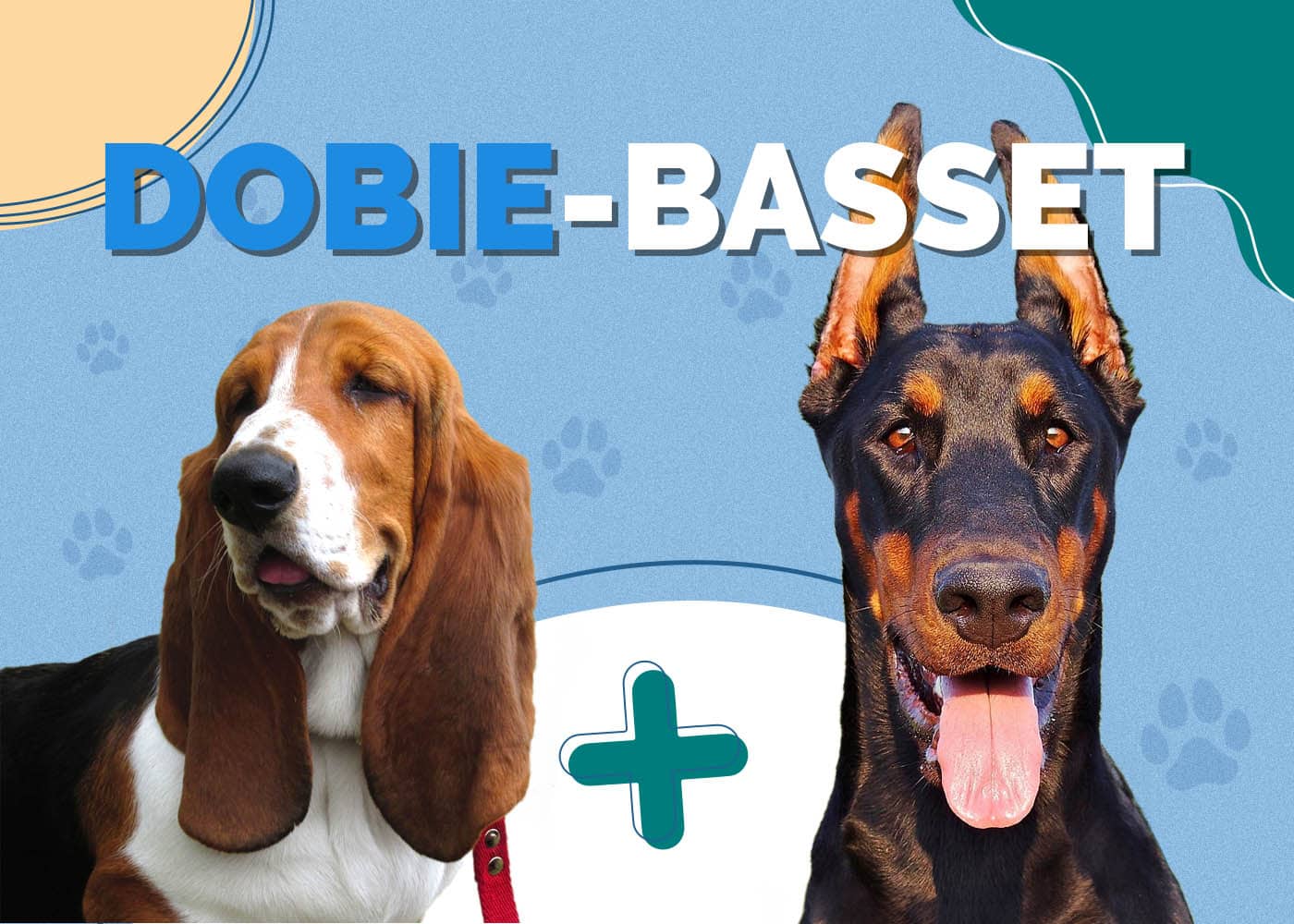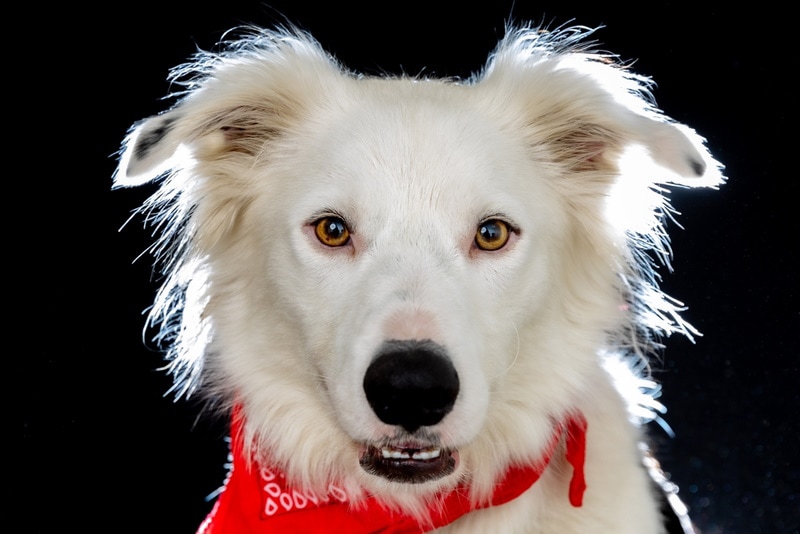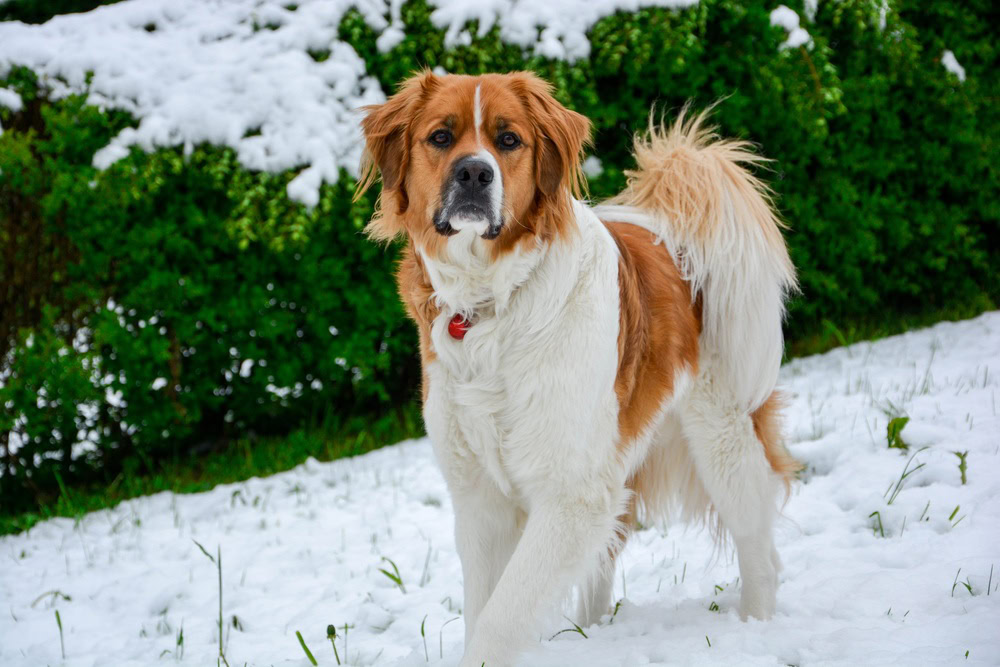Pointer Dog Breed Info, Pictures, Characteristics & Facts

Updated on

Height:
22 – 28 inches
Weight:
40 – 80 pounds
Lifespan:
12 – 17 years
Colors:
Black, brown, Isabella, white
Suitable for:
Hunters, those wanting a well-behaved but high-energy dog
Temperament:
Obedient, energetic, intelligent, affectionate, even-tempered, boisterous
When you think of hunting dogs, there’s a good chance that the Pointer is the first pup that springs to mind. These pups are commonly used in cartoons to represent hunting dogs, thanks to the clear visual cues they give off when spotting downed prey.
They’re not just working animals, though — they’re also fantastic pets. While they’re a high-energy breed, they’re every bit as loving and affectionate as a Labrador or Golden Retriever, two other hunting breeds that are more commonly kept as companion animals.
Since they’re not as common as those other two dogs, you may not be as familiar with Pointers as you are with their cousins. That’s okay because this guide will fill you in on everything you need to know about these wonderful mutts.
Pointer Puppies
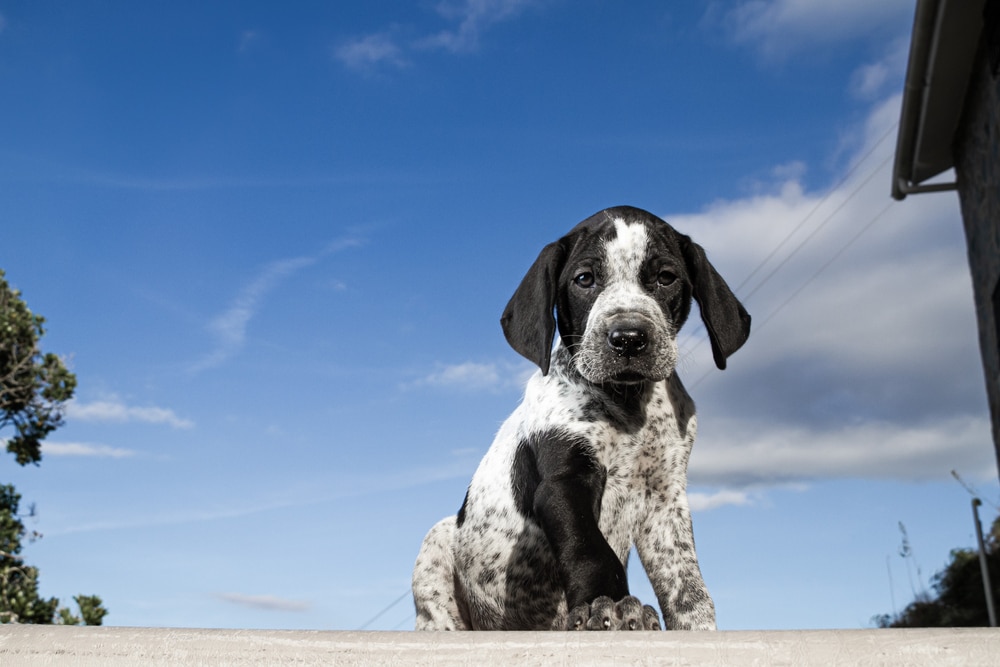
There are many words that you can use to describe Pointers: long, lean, graceful, elegant, etc. However, exactly none of those adjectives can be used to describe them when they’re puppies. Pointer puppies are some of the most adorably clumsy animals on the planet. They already have the long legs that they’ll sport when they reach maturity, but they have no idea how to use them yet. As a result, they’re constantly tripping over themselves, especially while playing.
That doesn’t slow them down a bit, though. Pointer puppies live to play and eat, and they can do both for hours on end. You can watch a Pointer puppy wipe out at top speed, doing a horrific cartwheel through the yard, and then pop up like nothing ever happened — indeed, like they meant to do that. They can be quite destructive while teething, but that’s a habit that they generally outgrow. Still, you’ll want to provide them with plenty of chew toys and exercise opportunities while they’re young.
Few people who bring home a Pointer puppy ever regret it. Those who do were simply unprepared for their exercise needs, so as long as you realize that you’re adopting a high-energy pup, you should be more than satisfied with your decision.
3 Little-Known Facts About the Pointer
1. Pointers Are Trained to Hold Their Stance Well After the Gun Has Been Fired
These dogs are known for their “pointing” stance (hence the name), and they use that stance to point out their prey. They hold this pose even after the hunter has taken their shot, as they won’t release it until given further instruction by their owners.
This helps prevent them from accidentally getting shot, but it’s also a testament to their fantastic discipline. Not only are they not spooked by the gunshot, but they’re also able to contain their excitement over the idea of fetching a fallen bird until released by their humans.
This may not seem that important if you’re not using them for hunting, but you can still take advantage of that predilection during regular training. Teaching them to “stay” should be a piece of cake.
2. They Were Bred for Hunting Before Guns Were Even Invented
Their ability to tolerate gunfire is even more impressive when you realize that the dogs were used for hunting before guns came along. They still pointed at prey, but their owners would then throw nets over the birds rather than shoot them.
This underscores their adaptability, as they can adjust to about any conditions or requirements that you may have of them. It also shows how much they love having a job to do, so if you can provide them with some form of constructive employment, it will go a long way toward keeping their energy levels in check.
3. While They Love to Work, They Love to Relax Just as Much
These dogs will spend all day working their tails off in the field, but once you bring them home, don’t be surprised if they race you to the couch. If you can provide them with the exercise that they need, you’ll find that they’re actually a relaxed, low-maintenance dog the rest of the time.
In fact, these pups can be downright lazy. They’ll take over your bed, couch, or beanbag, and they can have just as much fun sitting through a Netflix marathon as you do.
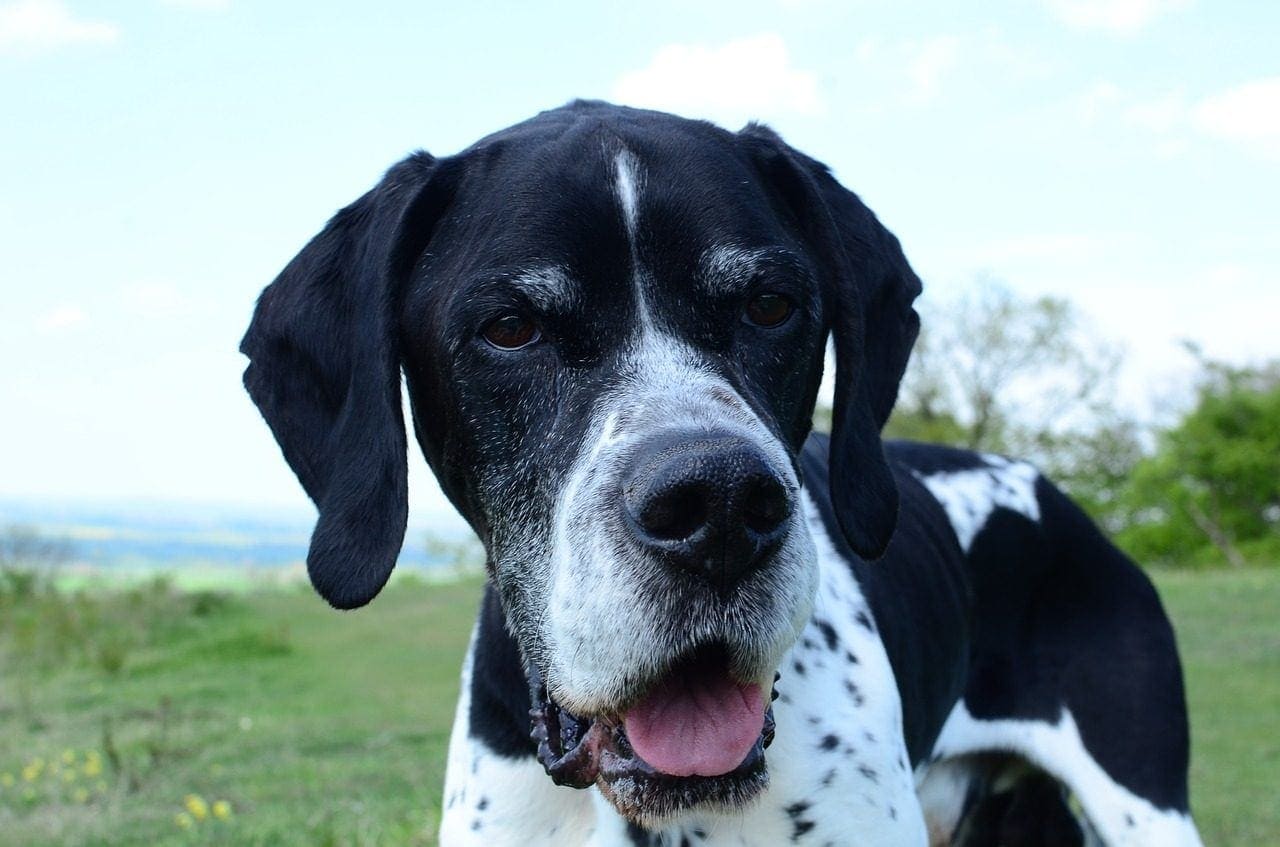
Temperament & Intelligence of the Pointer 🧠
Pointers are some of the most easygoing dogs on the planet. They’re even-tempered and rarely, if ever, show aggression, so they get along with almost everyone.
They’re affectionate and loyal, so don’t be surprised if you find them curled up in your lap the minute that you sit down. Don’t get one if you’re not okay with spending most of your downtime petting, cuddling, or otherwise reassuring your pup.
You’ll be hard-pressed to find a smarter animal. They love to learn, and you can teach a Pointer to do just about anything. Training them is a breeze, and they’ll soak up any instruction that you can dish out.
Even better, they’re not likely to use those high-powered brains for nefarious purposes. The one thing that you need to worry about is them escaping from your backyard, as they can find it difficult to turn down the opportunity to chase after prey.
If you have a secure enough yard with a tall enough fence, though, you can enjoy the company of an incredibly smart, affectionate animal.
Are These Dogs Good for Families? 🏡
When you think of family dogs, Labradors and Golden Retrievers are usually the first breeds that come to mind. Pointers deserve to be in that conversation too.
They are extremely patient and loving toward children, and they can play with them without getting too rough. You may need to watch out if you have toddlers, though, as a boisterous Pointer could potentially run right over a small child by accident.
They can also handle attention from every member of your brood, and they have the energy necessary to keep up with a long day playing and running around. You may need to enlist your entire family to tucker them out, in fact, as they can be tireless if they’re having fun.
These pups do well with big backyards, but they can make excellent apartment dogs as well. You’ll need access to a park or some other place where they can run around, though, as they’ll bounce off the walls if you don’t bleed off their excess energy.
They’re not known for playing favorites either, so they’ll happily bounce from one member of the family to another without feeling overprotective. Your kids can invite their friends over, and you won’t have to worry about your Pointer losing their mind about having an intruder in the house.
Does This Breed Get Along With Other Pets? 🐶 😽
Unlike many hunting dogs, Pointers enjoy the company of other animals. They’ll love having another dog in the house, as it will give them a playmate that can match their energy levels, and they’re not known for being aggressive with other canines.
They’re even tolerant of cats and other small pets, especially if they’re raised with them. They don’t have a strong prey drive, so you won’t have to worry about them stalking or chasing your kitty around the house.
However, they may see those small pets as playmates, so you’ll need to make sure that any roughhousing doesn’t get out of hand. Your cat may not enjoy wrestling with the dog as much as the Pointer enjoys wrestling with the cat.
All in all, though, don’t be surprised if you constantly find your Pointer curled up next to the cat on the couch.
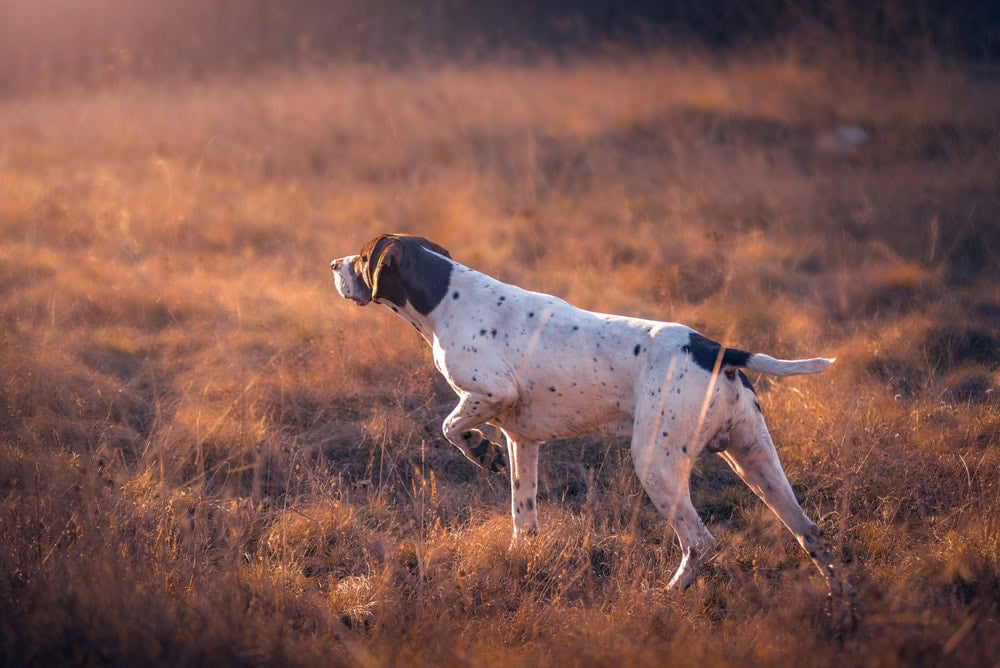
 Things to Know When Owning a Pointer
Things to Know When Owning a Pointer
Pointers are an easy breed to own, and they don’t require much in the way of specialized knowledge. They’re wonderful, all-American dogs and great for first-time owners.
However, there are still a few things that you should learn if you want to get the most out of your Pointer-owning experience. Knowing how and what to feed them, for example, will go a long way toward keeping them as healthy and happy as possible.
Pointers are great plug-and-play dogs, and the information below will give you a quick primer on how to best care for one of these animals.
Food & Diet Requirements 🦴
Pointers are medium-sized dogs, so they won’t necessarily eat you out of house and home. You still need to be mindful of what you feed them, though, as a high-quality diet can reduce the risk of health issues later in life.
A high-protein kibble is a good idea, as it will give them plenty of energy to run and play throughout their day. If you can find one that’s also high in fat and fiber, it will keep them feeling full while also ensuring that they stay regular.
Watch out for cheap carbs, as these can give them short-term bursts of energy but also increase the risk of obesity, which is terrible for these dogs. Avoid ingredients like corn, wheat, soy, and animal by-products, and instead, look for high-quality fruits and vegetables to go with lean meat sources.
They aren’t necessarily prone to overeating, but you still shouldn’t let them free-feed. Instead, give them one or two portion-controlled meals per day, and be sure to pick up their bowls when they’re finished.
You can give them treats if you like, but don’t go overboard. You don’t have to use them for training purposes, as these dogs are so eager to please that a few words of praise will do everything that a dog biscuit could.
Exercise 🐕
This is an energetic breed, so daily, vigorous exercise is a must. Fortunately, it doesn’t take much prodding to convince these dogs to run around at top speed, so you shouldn’t have much difficulty ensuring that they’re properly exercised.
They need plenty of room to stretch out their long legs, and if you don’t have a backyard big enough to accommodate them, you’ll need to find a park or other wide-open space to let them zoom around. They’re natural fits for dog parks, as they love to play with other pups and rarely show aggression toward strange animals.
Their obedient and energetic natures help them excel at sports like agility training, so you might want to consider investing in an obstacle course that you can set up in your backyard.
Mental stimulation is just as important as physical. These are smart dogs, and you need to tax their brains as much as their muscles. Obedience work is good for this, but you can also use treat puzzles or games like hide-and-seek to achieve the same goals.
If you give them all the exercise they need (roughly an hour a day should do the trick), you’ll find that these dogs are actually docile and laidback. They’re more than happy to let you relax at the end of a long day if you make sure to take care of them first.
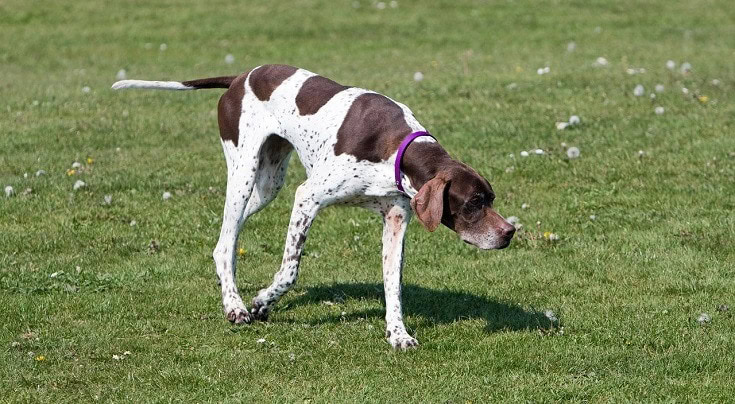
Training 🦮
There’s little that Pointers can’t be trained to do. If you’re a hunter, your Pointer will make a natural companion, and they’ll love every second of it.
Even if you’ve never planned a day of hunting in your life, you’ll still find it easy to train these agreeable dogs. They pick up on commands quickly, and since they’re so eager to please, you shouldn’t have to repeat yourself more than a few times.
They love to spend time with you, so they’ll gladly repeat the same commands over and over if it makes you happy. However, you should try to vary up their training as much as possible to keep them mentally engaged.
You should use positive reinforcement when training them, as they can be quite sensitive. Any sort of punitive measures are likely to backfire, so simply reward the behavior that you want to encourage and ignore any that you don’t.
Training a Pointer is so easy that even first-time dog owners should have no trouble doing it successfully. Of course, you can always enlist the services of a professional if you’re struggling, but these dogs prefer to get instruction from their family members, as it helps strengthen the bond between you both.
Grooming ✂️
Pointers have short, dense coats, so their grooming needs are minimal. You may want to take a slicker brush to them every week or so just to keep shedding under control, especially if you live in a hot climate, but it’s not essential.
Only bathe them when they’re visibly dirty, and avoid bathing them at all until they’re at least 6 weeks old. Washing them too frequently will strip their skin of important natural oils, increasing the risk of skin irritation.
You’ll need to trim their nails regularly, but if you let them run around enough, they may file their claws down on their own. Make sure they don’t grow too long, though, as that can lead to injury.
Their teeth should be brushed regularly (daily, if possible), and you should schedule a regular dental checkup with your vet to stave off the possibility of dental disease.
Their long ears can be prone to infection if not cleaned regularly, so do that once a week or so. Also, be sure to dry them out thoroughly if they get wet.
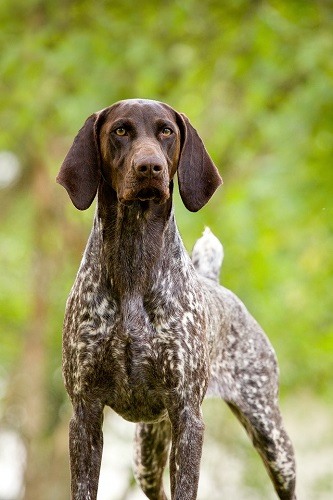
Health and Conditions ❤️
Generally speaking, Pointers are healthy dogs. They’ve managed to sidestep the inbreeding problems that have plagued other purebred dogs, so they remain genetically sound.
That doesn’t mean that they don’t suffer from a few different health issues, however. There are several things that you should be on the lookout for with these dogs, especially as they grow older.
It’s important to note that the decisions you make when raising these pooches can go a long way toward determining how healthy they will be later in life. The most important thing you can do is make sure they maintain a healthy weight, and you should also try to ensure that they get a proper amount of exercise.
They often suffer from joint issues, so it may behoove you to put them on a supplement like glucosamine early on in life. You should also be careful to limit high-impact activity like jumping, especially on hard surfaces like concrete.
Below, we’ve listed common issues that these dogs face. Not every Pointer will experience these (and your Pointer may experience issues not listed here), but the conditions below represent a good starting place for you and your vet to monitor your dog’s health.
- Cherry eye
- Skin allergies
- Ear infections
- Hip dysplasia
- Epilepsy
- Bloat
- Acral mutilation syndrome
- Congenital heart defects
Male vs. Female
Male and female Pointers are similar in most respects, but there are a few key differences you should be aware of.
Males tend to be a bit bigger than females, as they can weigh as much as 15 pounds more and stand a few inches taller. This is neither a good nor a bad thing but is simply a matter of personal preference (although you may need to feed a male a bit more).
If you’re using the dogs for hunting purposes, you should know that females tend to be a bit more timid in the field, while males are more aggressive and forceful. However, males get distracted much more easily, so you may find a female easier to train.
Both sexes are affectionate, but males can be a bit clingier, as females tend to prefer that you come to them. They’ll both enjoy a good cuddle on the couch, though.
Final Thoughts
We’re big fans of Pointers — and we think you will be too. These dogs make incredible pets, as they’re loving, loyal, and even-tempered.
The biggest issue with the breed is their high exercise requirements, but in that sense, they’re no different than Labradors or Golden Retrievers. As long as you can see to it that they get all the physical stimulation they need, you should have a calm, patient dog on your hands.
While they may not be as popular as some other hunting dogs, Pointers are every bit as good as their more common cousins. If you bring one home, don’t be surprised if you become a life-long devotee of the breed, as these pups can steal your heart from the first day you meet them.
Featured Image Credit: isakH, Pixabay


 Things to Know When Owning a Pointer
Things to Know When Owning a Pointer
